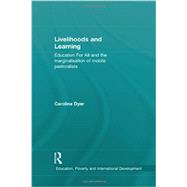- ISBN: 9780415585903 | 0415585902
- Cover: Hardcover
- Copyright: 6/11/2014
Current paradigms of #xE2;#xAC;#xDC;development#xE2;#xAC;" generally serve nomadic groups poorly: their visibility in policy processes is minimal, and their mobility is usually constructed by the powerful as a #xE2;#xAC;#xDC;problem#xE2;#xAC;", rather than as a rational livelihood strategy. Increasingly damaged eco-systems, shrinkage of natural resources, globalisation and urbanisation all pressurise nomads#xE2;#xAC;" livelihoods and often worsen, rather than alleviate, their poverty status and socio-economic marginalisation. These processes however also precipitate a new engagement with forms of education that may enhance occupational diversification and improve their future livelihood security and social status. Opening with a discussion of how the relationships between education, poverty and development have been conceived in dominant development discourses, this book reviews the disappointing international experience of education provision to nomadic groups. It highlights a lack of sufficient flexibility and relevance to nomads' changing livelihoods and, more fundamentally, education#xE2;#xAC;"s conceptual location within a sedentarist paradigm of development that is antagonistic to mobility as a legitimate livelihood strategy. India#xE2;#xAC;"s progress towards including groups marginalised by mobility is critiqued to provide a policy and practice context for the case study, based on ethnographic research, of the transhumant Rabaris of Kutch. The empirically-based chapters provide detailed insights into how this transhumant pastoralist community in northwest India engages with education as a social and economic development strategy for both adults and children; and how ethnographic and participatory research approaches can be used for policy advocacy for marginalised groups. The book highlights education#xE2;#xAC;"s complex, contested and often, inconsistent role in development and the social construction of poverty and calls for a critical reappraisal of the notion of #xE2;#xAC;#xDC;education#xE2;#xAC;" if it is to contribute to development as freedom for nomadic groups.







